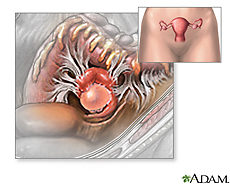National Institutes of Health
- The primary NIH organization for research on Polycystic Ovary Syndrome is the National Institute of Child Health and Human Development
 A service of the U.S. National Library of Medicine
A service of the U.S. National Library of Medicine  National Institutes of Health
National Institutes of Health
Polycystic ovary syndrome (PCOS) happens when a woman's ovaries or adrenal glands produce more male hormones than normal. One result is that cysts (fluid-filled sacs) develop on the ovaries. Women who are obese are more likely to have polycystic ovary syndrome.
Symptoms of PCOS include:
Women with PCOS are at higher risk of diabetes, metabolic syndrome, heart disease, and high blood pressure. Medicines can help control the symptoms. Birth control pills help women have normal periods, reduce male hormone levels, and clear acne. Other medicines can reduce hair growth and control blood pressure and cholesterol. There is no cure.
NIH: National Institute of Child Health and Human Development
References and abstracts from MEDLINE/PubMed (National Library of Medicine)
